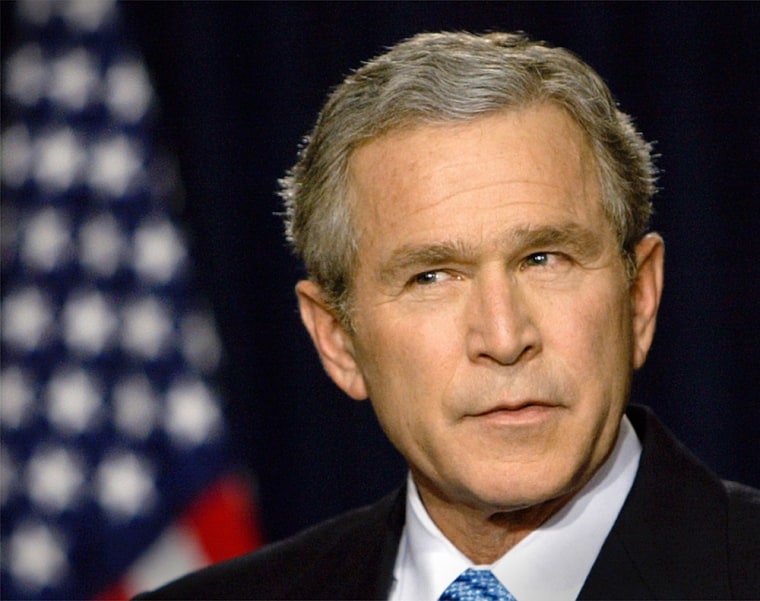It’s fair to say that 2003 was not the best of years for the colorful subset of world statesmen known as murderous dictators:
- In the Hague, Slobodan Milosevic went on trial before the U.N. war crimes tribunal, which was miffed at his propensity for “ethnic cleansing” of the people of Yugoslavia when he ran the country during the 1990s.
- In Liberia, President Charles Taylor cut a deal with Nigeria and fled the country, whose people he had brutalized for years. He also faces a U.N. war crimes trial when and if Nigeria ever agrees to turn him over.
- Idi Amin, whose reign of terror over Uganda during the 1970s made a lot of people wonder what all the fuss over Taylor was, died.
- And then there was Saddam Hussein, who began the year defiantly proclaiming that his Iraqi army would eviscerate American-led invaders and ended it hunched in a hole in the ground guarding his money.
Preoccupied as he was, first with facing down President Bush (known to Democratic presidential candidates as “The Miserable Failure” but to Saddam and his generals as “The Sequel”) and then with basic survival, Saddam sadly missed out on many of the never-in-a-million-years-could-you-have-predicted-them events that marked 2003 as one of the wilder in recent memory. It was a year that could only have been dreamed up by the writers for a Fox summer replacement sitcom.
At least he emerged into daylight in time to catch the tail end of the year’s biggest hit movie, the Paris Hilton sex tape.
For Iraq, Saddam shame
Just about the only major event Saddam did not miss was the war in his own back yard.
President Bush, accusing Saddam of harboring chemical and biological weapons of mass destruction, of seeking materials for a nuclear weapon and of conspiring with the al-Qaida terrorist network, called together a coalition of nations and invaded Iraq on March 19. He predicted that freedom-starved Iraqis would welcome U.S. forces and would soon enjoy the fruits of democracy.
None of that, as it happens, was precisely accurate:
- The coalition of nations consisted of Britain, Australia, a few Double-A and Triple-A NATO members and dozens of countries with names like Tonga. Most of the rest of the world’s military powers, led by France, Germany and Russia, stayed on the sidelines and actively worked against the U.S. campaign.
- The president’s declaration in his State of the Union address that Iraq had sought to buy weapons-usable uranium in Africa turned out to be false. The administration enters 2004 under investigation for whether it deliberately outed a covert CIA operative to retaliate against her husband, who publicly criticized the president’s claim.
- Democracy — installed by U.S. fiat and overseen by a U.S. administrator — did not bring peace and safety to Iraq. Anti-U.S. rebels were still conducting a guerrilla-style hit-and-run war as the year ended — a year during which more Americans died in Iraq after combat operations ended than actually died during them.
- U.N. weapons inspectors said they found no weapons of mass destruction when they returned to the country after Iraq was defeated.
Bearded in his own back yard
Still, even though a lot went wrong for the president, he did remove Saddam from power as promised. It just took the president a while to track him down.
Saddam was discovered by U.S. forces on Dec. 13 in a hole in the ground just outside his hometown. He surrendered meekly, leaving behind $750,000 and many questions, such as: Just what did he intend to do with all that money?
Some military experts said he would use it to pay for his escape. Others suggested he would help fund the anti-U.S. insurgency. Overlooked was the likelihood that he was waiting for the after-Christmas sales so he could do some interior decorating.
His forced vacation gave Saddam time to ponder what he will do with his future — presuming he escapes execution, of course. Now is the right moment for someone to fill the void in crazy-eyed, wild-haired Hollywood bad guys left by the death of veteran actor Jack Elam on Oct. 20 — by the time Saddam was found, he’d already perfected the look.
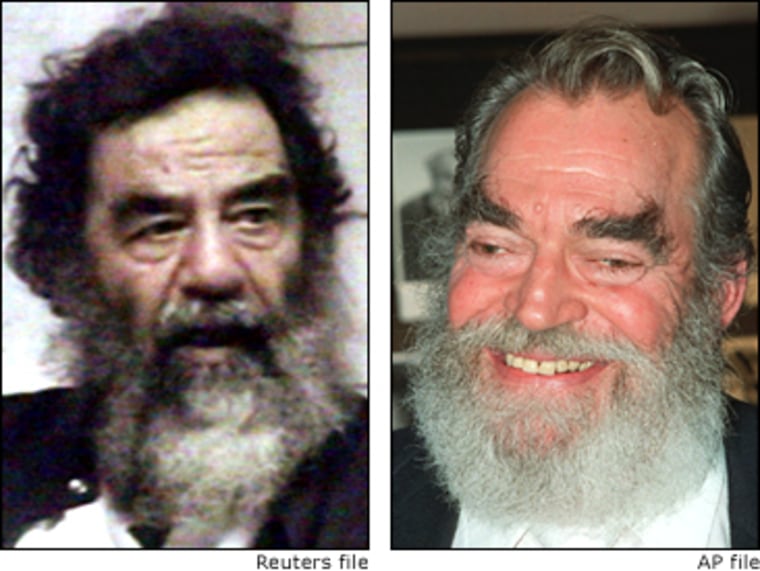
Bad news
It’s probably just as well that Saddam spent the year oblivious to the events going on outside the borders of Iraq. In many respects, 2003 was a dangerous and depressing year:
- The space shuttle Columbia disintegrated on re-entry Feb. 1, with the loss of all seven astronauts and almost 60 scientific experiments. An investigation revealed that a 2-pound piece of foam fell away from the shuttle and crashed into its wing.
- Suicide bombers replaced rogue al-Qaida pilots as the scariest terrorists around. More than 50 suicide bombers blew themselves up around the world this year, killing almost 700 people, including the United Nations’ envoy in Iraq, according to figures compiled by the New York newspaper Newsday.
- A surge of such attacks in Israel and the Palestinians led the Israeli government to resume its campaign of “targeted killings” of insurgent Palestinian leaders — “targeted killings” being its euphemism for assassinations.
- An earthquake virtually destroyed the southeastern Iranian city of Bam late in the year. Amid scenes of horrifying devastation, officials predicted that when all the bodies were recovered sometime next year, the quake will have killed as many as 40,000 people.
- Severe acute respiratory syndrome, or SARS, began spreading in Asia in February. By the end of the year, the flu-like pandemic had killed almost 800 people in two dozen countries and was re-emerging just in time for winter.
- Seventeen years after it was first discovered in Britain, mad cow disease arrived in the United States in December. In much the same way it kept declaring terrorist alerts but called on Americans not to change the way they live their lives, the government began an intensive investigation and recalled thousands of pounds of beef across the West but urged Americans to keep eating hamburgers.
- Tens of millions of Americans and Canadians were plunged into darkness Aug. 14 when three power lines failed in Ohio, starting a chain reaction across the East Coast. The blackout, the largest in U.S. history, drew attention to the dilapidated condition of the nation’s power grid.
- The worst wildfires in the state’s history began charring California in October, killing almost two dozen people and sending three-quarters of a million acres of forest up in smoke.
Final curtain calls
The year also saw the deaths of some of America’s most beloved figures, among them Bob Hope, who at one time or another was the No. 1 star in vaudeville, radio, television and the movies.
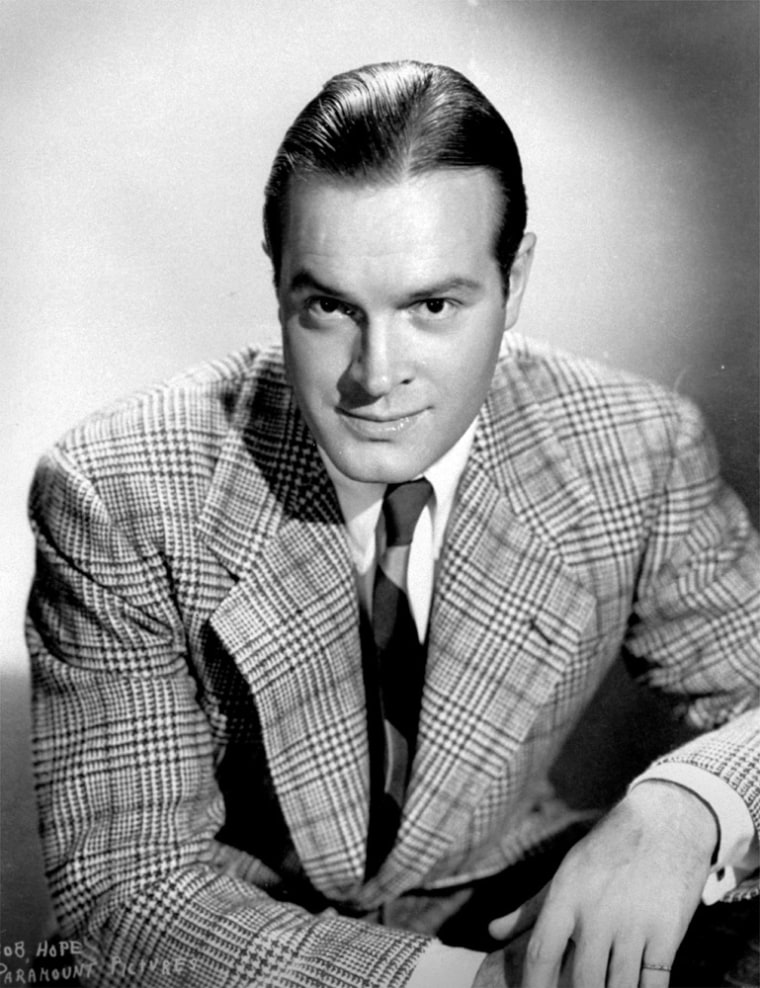
So did Katharine Hepburn, Gregory Peck and Fred “Mr.” Rogers.
Others passing from the scene included:
- 100-year-old former Sen. Strom Thurmond, the former segregationist who was revealed in death to have fathered a daughter with a black woman.
- Country music legends Johnny Cash and, shortly thereafter, his wife, June Carter Cash.
- Movie and stage star Donald O’Connor.
- Broadcast journalist David Brinkley.
- Tennis star Althea Gibson, an early inspiration of the civil rights movement.
- Television comedy star John Ritter.
Net gains and losses
But at least Saddam did pop up in time to enjoy the Paris Hilton sex tape, just a click away on any of approximately 452 spam e-mails each and every day.
Spam became the suicide bomber of the Internet in 2003 and the Sobig.f virus its SARS. Spam exploded with economic casualties approaching $20 billion in lost productivity, consultants said, thanks significantly to the virus’ hijacking of vulnerable computers that it turned into spam-spewing robots. The Web security firm MessageLabs calculated late in the year that two-thirds of all spam was being spread through computers taken over by Sobig.f and other viruses.
The government tried to respond by regulating spam, but most anti-spam and privacy activists complained that the Can Spam Act would make matters worse. Instead of banning unsolicited e-mail to anyone who had not asked for it, Can Spam overrode numerous state laws to make it illegal only to send such mail to anyone who had not “opted out” — that is, taken the initiative to tell every company in the world that he or she did not want ads for v.IagRa and raw pornography (including the Paris Hilton sex tape) tumbling into home e-mail accounts.
R2-Dean2004?
New adventures on the Internet also gave the nation its official, by-gosh-he’s-the-front-runner leading Democrat to challenge Bush’s re-election next November.
Howard Dean — previously a little-known doctor, governor of Vermont (of all places) and honest-to-goodness candidate for president, just like Al Sharpton — rode the wave of anti-war sentiment and the community Web site meetup.com to creep up on the establishment Democrats and leap into the lead.
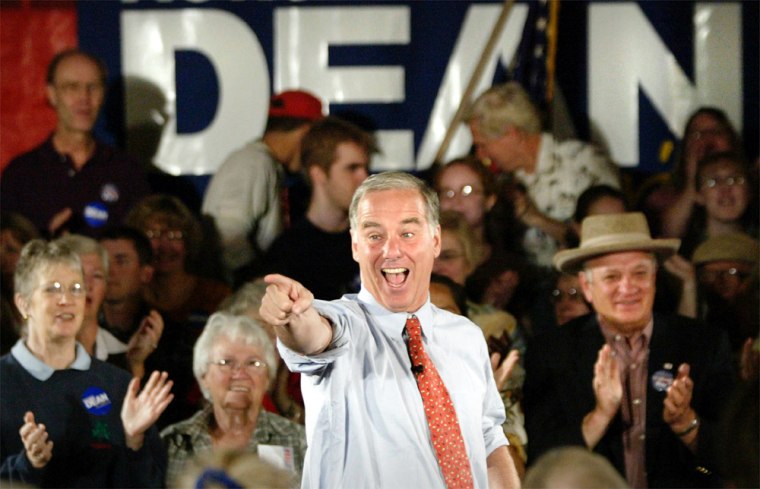
Republicans, all the while, were stuffing the president’s re-election campaign chest with record amounts of money, solemnly declaring Dean a serious challenger in public while praying for his nomination in private, convinced that he was George McGovern Jr.
Dean was not the most interesting politician newly minted on the national scene, however. Nor was Wesley Clark, the blunt, sharp-spoken, silver-haired retired general — Ross Perot gone to finishing school — who surprised Americans with the reality that there are, in fact, Democrats in the military.
That honor belonged to Arnold Schwarzenegger, the Austrian-born bodybuilder, action movie star and — really — governor of California, who surprised Americans with the reality that there are, in fact, Republicans in Hollywood.
The Headline-inator!
Even though they had elected him governor twice, Californians decided this year that they’d had enough of their appropriately named governor, Gray Davis. Pounded by unceasing reports of the state’s financial crisis, they voted Oct. 7 to recall Davis from office and elected Schwarzenegger, making the husband of Maria Shriver the first Republican Kennedy in public office.
Schwarzenegger brushed aside more than 100 other candidates, among them diminutive retired TV sitcom star Gary Coleman and Mary Cook, aka Mary Carey, the porn star whose war chest was not a financial one. She finished near the top, becoming the nation’s most famous star of sex movies until Paris Hilton arrived on the scene.
Indeed, 2003 was a singularly weird year in the media and entertainment industries:
- The New York Times, usually considered the nation’s soberest, most reliable newspaper, overhauled its masthead and appointed its first ombudsman after a number of embarrassing incidents.
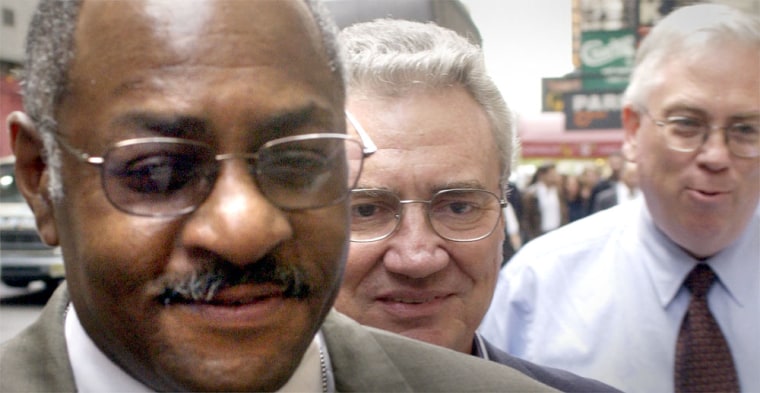
A young reporter, Jayson Blair, quit after he was caught fabricating dozens of high-profile stories, putting pressure on Executive Editor Howell Raines to restore confidence in the paper. Then a Pulitzer Prize-winning reporter, Rick Bragg, quit after it was discovered that he had hired local journalists to do his reporting for him, allowing him to write his famously evocative features about colorful small towns without ever actually visiting those towns.
By the end of the year, two Times reporters were in court defying a judge’s order that they reveal their sources for since-“corrected” stories that painted a picture of government scientist Wen Ho Lee as a Chinese spy. Lee was found not guilty of all but the single most minor charge against him after an exhaustive investigation turned up almost nothing.
Eventually, as complaints about his brusque management style compounded his problems, Raines himself quit, taking Managing Editor Gerald Boyd with him.
- Fading pop superstar Michael Jackson was arrested in December and charged with seven counts of child molestation. Complaining about the public attention the charges had brought, Jackson sought to slip away quietly by agreeing to be interviewed on “60 Minutes.”
- Radio talk-show host Rush Limbaugh first lost his job as a studio commentator for ESPN’s coverage of the National Football League for suggesting that Philadelphia Eagles All-Pro quarterback Donovan McNabb was overrated because he is black. Then he entered a rehabilitation facility after announcing that he was addicted to prescription painkillers. Then he was placed under investigation in Florida for allegedly “doctor shopping” to illegally obtain prescriptions for painkillers like OxyContin.
- The bluegrass revival champions the Dixie Chicks saw their radio airplay dry up after lead singer Natalie Maines criticized Bush during the war in Iraq.
- Fox News Channel host Bill O’Reilly reportedly persuaded his bosses to take liberal humorist Al Franken to court for publishing his picture on the cover of a book called “Lies and the Lying Liars Who Tell Them.” Franken, noting that the controversy propelled his book to the top of the best-seller lists, thanked him profusely.
- “Bennifer,” about whom the less said the better.
Oh, rats
It was also a bad year for:
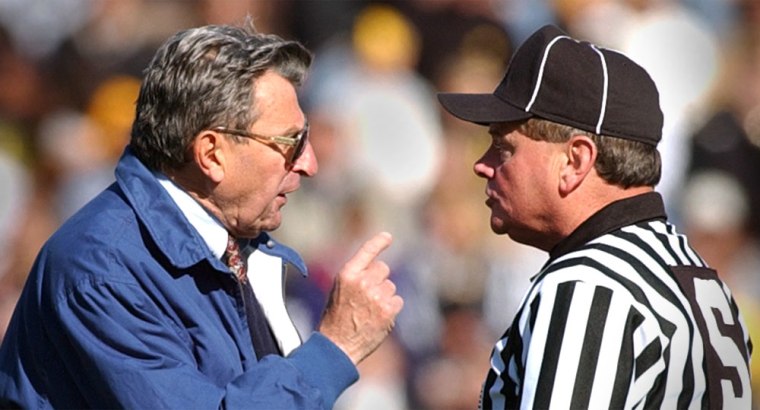
So 2003 is history — a year of transition, war, sickness and spam. All in all, most of us are probably pretty glad to see the back of it. As years go, after all, there have been better.
But we’ll always have Paris.
